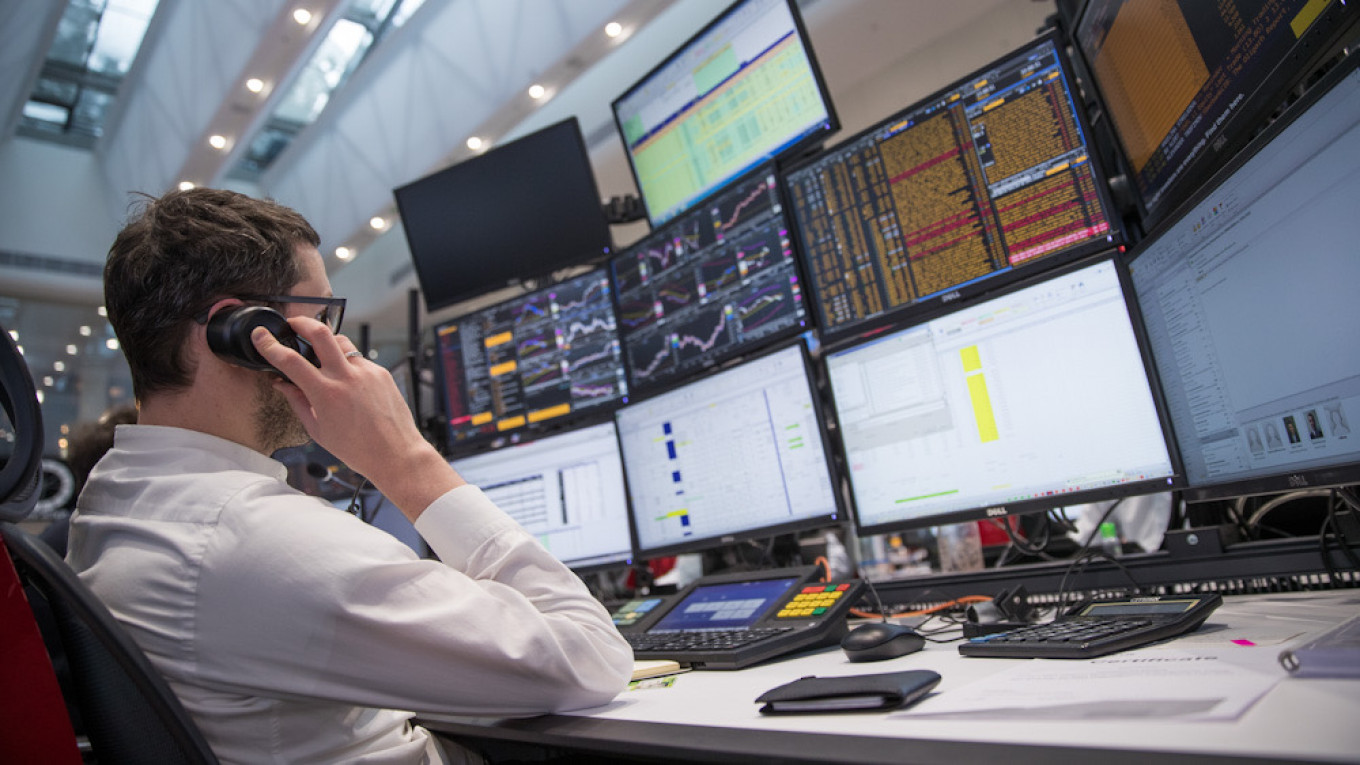Russian retail investors are finally investing in stocks as they look for better returns following the steady fall of bank interest rates over recent years — but the Central Bank is worried that risks for the financial sector are rising as a result.
After decades of high inflation — and high bank deposit rates — sustained interest rate cuts by the Central Bank have brought the country’s key rate to a record low of 4.25%. The cuts mean bank deposits — which long offered high interest rates to Russians looking to protect the value of their savings against inflation, which regularly hit double digits — no longer pay as attractive a return, and Russians have begun to cast about for other investments.
Retail investments into stocks have accelerated every month this year, reports the Central Bank. The third quarter set a new record for the number of clients signed up with brokers — up by more than a quarter, or 1.6 million, to a total of 7.6 million. Over the year the number of brokerage clients has already more than doubled.
In addition to falling interest rates, part of the story is a new tax-friendly investment account, called the Individual Investment Account (IIA). The number of IIAs increased two-and-a-half times between September 2019 and September 2020 to 2.9 million, with 525,000 new accounts opened in the third quarter, the Central Bank said.
In October 2020, the Moscow Exchange also set new records in the stock market and is trying to keep up with demand from these new retail investors. In August it launched the possibility to buy foreign-listed companies, and by the beginning of November the daily turnover in trading foreign-listed stocks was up to 1.5 billion rubles ($20 million). Private investors now account for 43% of the volume of all trading on the stock market, up from 34% in 2019.
Late starter
Russian authorities have long tried to encourage the average Russian to invest in order to create a new source of capital, but each attempt in the past has been met with disaster.
In 1996, Boris Yeltsin launched mutual investment funds, and several international companies moved in hoping to reap profits from an investment bonanza. Just 18 months later the market crashed in the 1998 default crisis.
A decade later, another attempt was made to rope retail investors into the stock market through VTB Bank’s initial public offering (IPO). The May 2007 launch was dubbed the “people’s IPO.” The bank raised over $8 billion in an offer where shares priced at 13.6 kopecks ($0.005) and over 100,000 retail investors bought in.
Yet again, within 18 months the markets crashed in the 2008 financial crisis, leaving retail investors holding shares worth half their original value. Even today, the shares are worth 38 kopecks each, which, following the fall of the ruble since 2014 means they are worth exactly the same as the IPO price — half a cent ($0.005) each.
This time around, the rapid growth of private investors moving into stocks — and other products, like real estate — is being driven by falling returns on bank deposits.
Russia’s top ten commercial banks were offering an average deposit rate of 7.72% in March 2019. That has fallen more than three percentage points since to 4.53% at the start of October — only just above inflation, which is expected to come in around 4.2-4.3% at the end of the year.
The volume of ruble deposits is still growing this year — up 1.1 trillion rubles ($14.5 billion) so far, but it has seen sharp volatility and swings in relation to market turmoil throughout the year. And the Central Bank says ordinary Russians are more energetically looking for alternatives.
Rising concerns
But with interest rates at their lowest level in modern history, the Central Bank is now worried that an outflow of deposits carries risks for Russia’s financial system.
In its Financial Stability Review published last week, the Central Bank for the first time said the flow of retail funds into the stock market was a risk to the Russian financial system.
The Central Bank listed three specific risks.
First, the danger of a boom mentality, when hype about rising returns causes investors to be incautious when making investment decisions.
Second, the growing popularity of foreign financial market instruments actually means an outflow of funds from the Russian economy.
Third, the growth of citizen participation increases the systemic importance of the stock market — its performance is becoming an important factor in the wellbeing of Russians, and their active participation can increase volatility, writes the Central Bank.
Despite explicitly citing them for the first time, the Central Bank calls all these risks limited, and has been keeping a close eye on the retail investment boom for many months already. It believes a new law which came into force in July reserving the more risky parts of the market for “qualified investors” — those who have passed a test — will help mitigate their concerns.
Moreover, the Bank didn’t just highlight concerns.
It also said this build-up was a natural stage in the development of Russia’s capital markets, which remain small by international standards. It pointed to the U.S. market, where securities account for 51% of the country’s private savings, as an example.
The main consequence of the flow of money from Russians to the stock market is its growing importance for the economy and the growing role of decisions of small investors in the dynamics of the market.
A version of this article first appeared on bne IntelliNews. Follow on Twitter @bneIntelliNews.
A Message from The Moscow Times:
Dear readers,
We are facing unprecedented challenges. Russia's Prosecutor General's Office has designated The Moscow Times as an "undesirable" organization, criminalizing our work and putting our staff at risk of prosecution. This follows our earlier unjust labeling as a "foreign agent."
These actions are direct attempts to silence independent journalism in Russia. The authorities claim our work "discredits the decisions of the Russian leadership." We see things differently: we strive to provide accurate, unbiased reporting on Russia.
We, the journalists of The Moscow Times, refuse to be silenced. But to continue our work, we need your help.
Your support, no matter how small, makes a world of difference. If you can, please support us monthly starting from just $2. It's quick to set up, and every contribution makes a significant impact.
By supporting The Moscow Times, you're defending open, independent journalism in the face of repression. Thank you for standing with us.
Remind me later.







